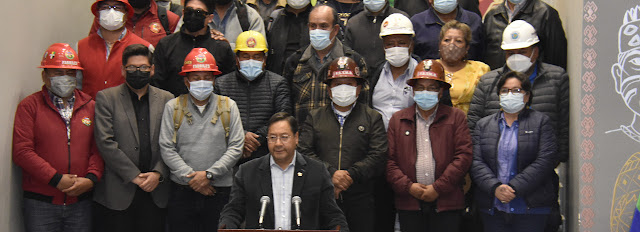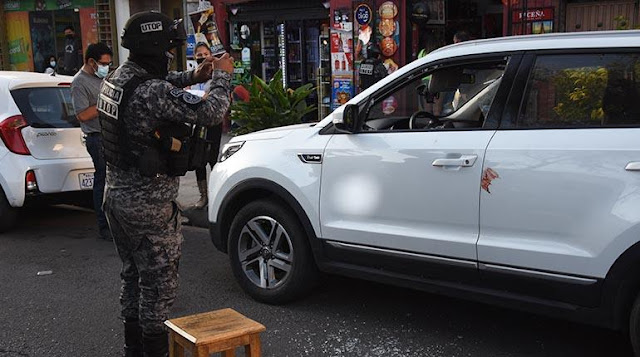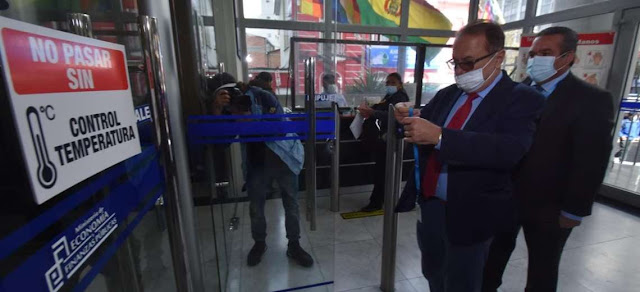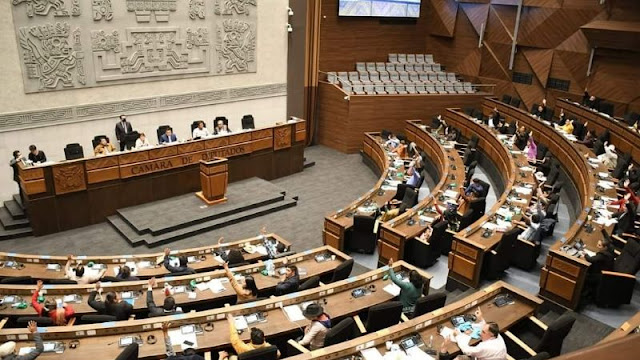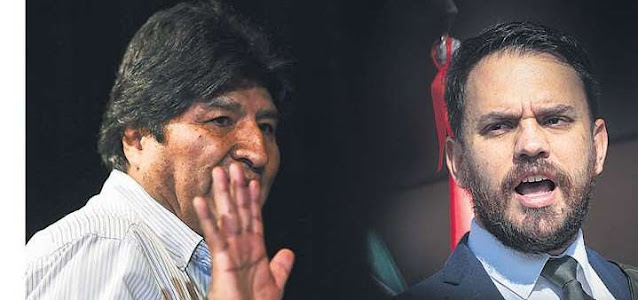In the oral trial against him for an alleged coup d'état, Añez told the judges how he became President. He said that he came to office by constitutional succession and did not coordinate with the military or the police.
Jeanine Añez took the floor in the oral trial for the "Coup d'Etat II" case, said that she "did not move a finger" to become President and blamed Evo Morales for the violent events of 2019, considering that if he had complied with the Constitution regarding the limit of repostulations, the confrontations would have been avoided.
Añez indicated that he took office by constitutional succession and that up to that moment he did not know any of the high military or police commanders. He called the former presidents of the Senate and Chamber of Deputies "cowards" for not assuming this responsibility. She indicated that when she assumed the leadership of the State, she worked with the Legislative Assembly.
"It was not Añez (referring to herself) who gave instructions, orders. I did not move a finger to reach the Presidency. My name began to appear in the media by constitutional succession. I could have said no because at that time the president (Evo Morales), the vice president (Álvaro García Linera), the president of the Chamber of Senators, the president of the Chamber of Deputies, the vice president of the Chamber of Senators had resigned. That is why (the responsibility) fell on Jeanine Añez", said yesterday the former president in the oral trial.
Yesterday's hearing was held in person at the Miraflores prison, where the former president has been held since March of last year. It was the first time she appeared before a court in person. The police deployed an operation to prevent MAS supporters from protesting at the prison gates, as it happened in past hearings, which once affected the health of the accused.
In her statement, Añez recounted the events that led her to lead Bolivia since November 2019 for almost a year. "We all know the convulsion that the country was going through, we were all witnesses. It has its origin. None of this would have happened if Evo Morales had respected the Constitution which is clear: The president and vice president have the right to be reelected only once," she said.
The former president said that Morales was seeking a "fourth reelection", "he wanted to elect himself eternally". That "arbitrary" decision had a response from the people that grew with the denunciations of electoral fraud.
"At that time I was an elected senator and I was in my apartment doing a peaceful demonstration like any other citizen," she said. Añez mentioned that she had "parliamentary privilege" and assured that for that reason she could not be accused in an ordinary trial. "I do not recognize this court or the accusation". She indicated that she should be subjected to a trial of responsibilities.
She considered that if she had committed "some transgression" as senator, it was up to the Assembly to send the case to an ethics commission, but they did not do so at the time. "On the contrary, (the Legislative) endorsed the constitutional succession, we worked in a coordinated manner. I did not know that a 'de facto government' had an assembly," he said.
She recalled that before assuming the Presidency there were already deaths in the streets. She said that they accuse her of having "contacts" with military and police, but she was in Trinidad. "How is it possible that she is a super senator who was manipulating everything to take power. Nothing could be more false. She had no voice or vote for anything, she was in the street as a citizen."
Añez questioned Adriana Salvatierra, former president of the Senate, and Víctor Borda, former president of Deputies, for not accepting the leadership of the country. "They did not have the courage to assume the Presidency because they were cowards, because they knew they had a country in flames due to the upheaval".
She denied that she had made "arrangements" with the military so that they would wait for her in La Paz. "I want to tell you that I do not know the gentlemen who are now accused (...) the military or police. I was not in a position to instruct, nor give orders to anyone, nor in my party," she said.
Añez said that she arrived in the city of El Alto in a commercial plane and a military helicopter was waiting for her. She was in the company of the now former senator Óscar Ortiz. Both were afraid of being kidnapped because "the military was working with Morales", but they did it because there were no conditions to go down to La Paz by car.
That night they arrived at the Military College. The next day they tried to install the Assembly and "everyone" assumed that she would be the successor after the series of resignations. She said that at that time the violence was almost unstoppable, the houses of Casimira Lema, Waldo Albarracin, six police modules and the PumaKatari in La Paz were burned.
"We met with the parliamentarians and we had the obligation to find a solution because the cowards fled. By that time, Morales and (García) Linera left for Mexico, did I provoke that?" he asked. "Therefore, they cannot say it was orchestrated. I was a product or consequence of this situation. That was my crime, to pacify the country, to assume power by constitutional succession", he said.
At that time there were already institutions that sought to pacify the country and meetings were held, such as the one at the Catholic University. "At that moment my name did not come up, but that of the second vice-presidency. They asked me -respecting the constitutional succession- if I would assume power. I answered that if I have the support, why I am not going to impose myself and I assumed it as such", he said.
After his statement, Añez invoked his right to silence and avoided answering questions from the Prosecutor's Office. In the afternoon, the two ex-chiefs of the Military High Command, Jorge Pastor Mendieta Ferrufino and Flavio Gustavo Arce San Martín, testified from the San Pedro prison. The hearing went into a new recess until Tuesday, April 12, at 10:00.
Former military chiefs reject accusations and reveal data
In the oral trial for the "Coup d'Etat II" case, the former chief of the General Staff of the Armed Forces Flavio Gustavo Arce San Martin said yesterday that he "does not understand exactly why he was accused". "I have not participated directly in any of those facts."
"My function I exercised as of December 24, 2018. I was the chief of the General Staff of the Armed Forces (FFAA). I culminated on November 12, 2019," he indicated. "My person did not fulfill the position of commander in chief of the FFAA and my functions were strictly of direction, planning and supervision of the work developed by the General Staff, the collegiate body that contributes to the commander's tasks," he said.
He continued: "I issued orders and instructions to carry out the decisions adopted by the commander in chief. The one who makes decisions in the Armed Forces is the commander-in-chief.
Regarding the accusations against him, Arce said that the use of helicopters is in charge of the Air Force and that the landing at the Military College depends on the authorization of a force other than his own. He emphasized that no member of the Air Force or the Military College mentioned him in his statements.
New revelations
In the oral trial, former Army Commander Jorge Pastor Mendieta testified yesterday that former Armed Forces Commander Williams Kaliman maintained permanent contact with former President Evo Morales until the moment when the plane that took him out of the country took off from Chimoré.
He also said that when the aircraft was about to take off, Kaliman asked Morales why he was leaving the country. According to the military officer, the former president responded that the military "studied for that", that they were experts in "negotiating" and that the bases had surpassed him. He also stated that the former president suggested Kaliman to negotiate with the former Minister of Rural Development, César Cocarico.
